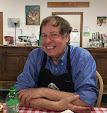Coffeeshops and social work? There's really nothing unusual about that.
In fact, coffeeshops and social work have been together since the beginning. Jane Addams, social work's founding mother, opened a coffeehouse at Hull House within a few years after she moved into the Chicago neighborhood. By 1900, the coffeehouse had its own building - with a theater and gym above it.
In her writing, Jane Addams describes a coffeeshop as a place where people could meet and talk without regard to social or economic status. She envisioned it as a community meeting place where all would be welcome. She also said the coffeeshop was started as an alternative to bars. (There were about 50 bars within walking distance of Hull House at the time the coffeeshop started.)
Wild Bill's Coffeeshop may be the only coffeeshop sponsored by a school of social work in the US. But it is just one of many efforts to continue the tradition of blending a coffeehouse and social work.
ACLU has roots in social workOne important purpose of the Hull House coffeeshop was to provide a place for people to talk about political and social issues. This was part of the vision of Jane Addams who believed that free speech was essential to a democracy. All were welcome to come to Hull House and present their views.
Jane Addams had a vision of a free people living in a free country.Again and again, she spoke and wrote about the importance of freedom and
democracy. To advance this idea, she also played an key role in the formation of a host of organizations, including the NAACP, the National Women's Suffrage Association, and the Women's International League for Peace and Freedom.
Events in 1919 and 1920 prompted her to join others in forming still another group, the American Civil Liberties Union. In November of 1919, federal agents all over the US arrested over 10,000 people. Those detained were targeted because of their political views and in some cases solely because of their ancestry. Most were never charged with any crime. Many were held in jail for months without any hearing in court. About 250 of those arrested, including Emma Goldman, were deported.
Addams spoke out against this injustice in a November 1919 speech in Chicago:
"Hundreds of poor laboring men and women are being thrown into jails and police stations because of their political beliefs. In fact, an attempt is being made to deport an entire political party.
"These men and women, who in some respects are more American in ideals than the agents of the government who are tracking them down, are thrust into cells so crowded they cannot lie down.
"And what is it these radicals seek? It is the right of free speech and free
thought; nothing more than is guaranteed to them under the constitution of the United States...
"We are trying to suppress something upon which our very country was founded -- liberty."
(Teaching History Online: http://www.spartacus.schoolnet.co.uk/USAaddams.htm)
But the protests of Addams and others were ignored by US Attorney General A. Mitchell Palmer and J. Edgar Hoover, his special assistant. In January 1920, the two federal officials ordered the arrest of another 6,000 people Again, few were ever charged with any crime and many were held for months.
That prompted Addams and other activists to meet and come up with a response.That must have been some meeting. John Dewey, a leading voice for progressive education, was there. (His book, Democracy and Education, is a powerful and eloquent argument for experiential learning rather than learning based on tests and lectures.)
Upton Sinclair, author and journalist, was there. (He was one of the writers referred to as Realists, along with Stephen Crane and Sinclair Lewis among others. His book, The Jungle, tells a story of the horrors of working in a meatpacking plant at the turn of the century.)
Elizabeth Gurley Flynn, a labor organizer and leader in the IWW, was there, too. (Her autobiography, Rebel Girl, takes its title from a song Wobblie troubador Joe Hill wrote for her in 1915 while he was in jail waiting execution in Utah. The story of Hill's life and the Wobblie movement is movingly told in a musical titled "Salt Lake City Skyline.")
Others there for the meeting included Helen Keller, Jeanette Rankin and James Weldon Johnson.
The group decided to form a new organization dedicated to protecting the rights of individuals and political groups. They chose the name American Civil Liberties Union. (http://www.aclu.org/library/nadine.html)
The ACLU is still around today and still doing the work it was chartered to do more than 80 years ago. Chapters are organized in states and cities throughout the United States.
Quotation's for tea drinkersThis selection of quotations is for tea drinkers.
Where there's tea, there's hope - Arthur Pinero
When we sip tea, we are on our way to serenity - Alexandra Stoddard
Love and scandal are the best sweeteners of tea -- Henry Fielding
I hire tea by the tea bag -- Martin Amis
Two loons for tea -- Name of a Seattle pop music duo
Twinkle, twinkle little bat
How I wonder where you're at
Up above the world you fly
Like a tea tray in the school -- Lewis Carroll

